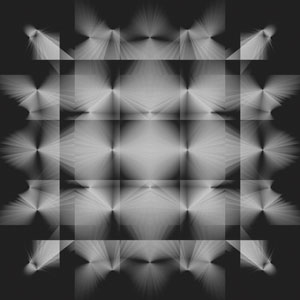Wraetlic Wraetlic
Glasgow native Alex Menzies—best known for his work under the alias Alex Smoke—has always been […]

Glasgow native Alex Menzies—best known for his work under the alias Alex Smoke—has always been a keen experimenter; his techno releases tend to be underpinned by dark, esoteric arrangements that seem to owe more to Menzies’ side career as a classical composer than to any prevailing trends in club music. Yet Wraetlic—a project born, if the wording of the record’s press dossier is to be believed, out of a growing sense of frustration at the pain of existence, a feeling rooted in a forced hiatus due to ill health—sees Menzies stepping further than ever away from the constraints of conventional dance music to create his most unique, and possibly most cohesive, work to date.
Opening track “Anothering” immediately sets the tone for the album; Menzies is still working with the sound palette of dark techno, yet compositionally, the track feels like a warped take on the synth pop of early-’80s Gary Numan, with Menzies’ own heavily processed vocals taking a prominent role throughout. His lyrics are largely indecipherable, and his voice has a monotonous and often jarring quality to it, but the vocal lends a haunting and intermittently unsettling atmosphere to the music. There’s something in this approach that’s reminiscent of Darkstar’s debut LP North, in part due to the fact that both albums combine the influence of classic electro-pop with more contemporary electronic sounds, but more significantly in the way that both artists manage to make music that is intrinsically mechanical and dehumanized, and inject it with genuine emotion.
It’s the interplay between these contradictory textures that gives rise to Wraetlic‘s best moments. On “PintleGrist,” Menzies’ oddly chant-like vocal fights for prominence—and ultimately loses—against a rigid drum-machine loop and laser-like synth, while “Hymn To The Departed” sees him accompanied by dissonant, droning synth lines that sit uneasily above a bed of subtly melodic percussion. In effect, Menzies seems to be casting himself as a man against the machine—a helpless, largely unheard voice overpowered by imposing and vaguely threatening surroundings.
Throughout the LP, he handles the production of these disparate elements with deft skill; his drums are precise and clean, and they cut perfectly through the often muddy formant layers of drone and melody. As deep as he strays into the realms of electro weirdness, everything remains underpinned by Menzies’ solid production—”Scunner,” for example, despite veering into peculiar territory compositionally, remains fixed around a classic arpeggiated techno synth line.
Wraetlic’s limitations lie, however, in the fact that it really requires the listener to buy into its overly melodramatic world view. Menzies does an excellent job of capturing a mood of overblown futility and amped-up melancholia, but as a listener, one needs to be ready and willing to go along for the ride; otherwise, it’s all in danger of coming across a little cartoonish. Interestingly, the three impressive bonus remixes that accompany the album feel like they’re there to redress the balance slightly—while none are exactly straightforward club refixes, each drags Menzies’ work back into marginally more familiar territory. Both Jon Convex and dBridge turn in dark, rave-ready tracks that relegate Menzies’ vocals to a more atmospheric role, while Paul Rose, working under his SCB alias, reclaims advance single “Rats” in the name of hard-edged techno.
Still, despite being something of an oddity, and a relatively inaccessible one at that, as a complete package Wraetlic makes for, at the very least, a unique and often fascinating listen. Whether or not one buys into Menzies’ unrelentingly bleak vision, it’s hard not to admire how well he captures the mood.

